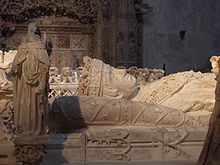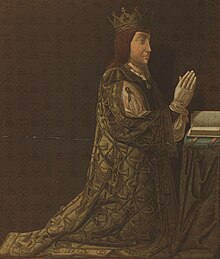John II of Castile
| John II | |
|---|---|
 Tomb of John II in the Miraflores Charterhouse | |
| King of Castile and León | |
| Reign | 25 December 1406 – 20 July 1454 |
| Predecessor | Henry III |
| Successor | Henry IV |
| Born | 6 March 1405 Toro, Zamora |
| Died | 20 July 1454 (aged 49) Valladolid |
| Burial | |
| Spouses | |
| Issue among others... | |
| House | Trastámara |
| Father | Henry III of Castile |
| Mother | Catherine of Lancaster |
| Signature | |

John II of Castile (Spanish: Juan; 6 March 1405 – 20 July 1454) was King of Castile[1] and León from 1406 to 1454. He succeeded his older sister, Maria of Castile, Queen of Aragon, as Prince of Asturias in 1405.
Regency
[edit]John was the son of King Henry III and his wife, Catherine of Lancaster, a granddaughter of King Peter; Peter had been ousted by Henry III's grandfather King Henry II.[2] John succeeded his father on 25 December 1406, and united in his person the claims of both Peter and Henry II. His mother and his uncle, King Ferdinand I of Aragon, were co-regents during his minority. When Ferdinand I died in 1416, his mother governed alone until her death in 1418.
Personal rule
[edit]John II's reign, lasting 48 years, was one of the longest in Castilian history, but John himself was not a particularly capable monarch.[3]
John II of Castile appointed the noble Don Diego López de Medrano, lord of San Gregorio, as his mayordomo mayor and royal guard.[4][5]
He spent his time verse-making, hunting, and holding tournaments. His favourite, Álvaro de Luna, heavily influenced him until his second wife, Isabella of Portugal, obtained control of his feeble will. At her instigation, he dismissed and executed his faithful and able servant, an act which is said to have caused him much remorse.[6] The relationship between Álvaro and Juan has been described as pederastic.[3]
John II's Regents declared the Valladolid laws in 1411, which restricted the social activity of Jews. Among the most notable of the provisions were outlining that Jews must wear distinctive clothes and banned them from holding administrative positions. However, once John took control of the throne for himself in 1418, he (though likely influenced politically by de Luna) reversed such ordinances, favoring instead a more tolerant attitude toward the already battered Jewish population of Castile following the mass wave of conversions between 1391 and 1415.
In 1431, John placed Yusuf IV on the throne as the Sultan of Granada in the Moorish Emirate of Granada, in exchange for tribute and vassal status to Castile.[7] This exchange is depicted in the short ballad the Romance of Abenamar.
He was "[T]all and handsome, fair-skinned and slightly ruddy... his hair was the color of a very mature hazelnut, the nose a little snub, the eyes between green and blue... he had very graceful legs and feet and hands."[8]
John II was the single largest contributor to the continuing construction of the Alcázar of Segovia and built the "New Tower" known today as the "Tower of John II".
John II died on 20 July 1454 in Valladolid.
Family and children
[edit]In 1418, John married Maria of Aragon, the oldest daughter of his paternal uncle, Ferdinand I of Aragon.[2] The marriage produced:
- Catherine, Princess of Asturias (1422–1424), his heiress presumptive from her birth until her death
- Eleanor, Princess of Asturias (1423–1425), his heiress presumptive from the death of Catherine until the birth of Henry
- King Henry IV of Castile (1425–1474)[2]
- Infanta Maria (1428–1429)
Of all their children, only the future Henry IV of Castile survived infancy. John was widowed in 1445 and remarried to Isabella of Portugal,[2] daughter of Infante John of Portugal, with whom he had two children:
- Queen Isabella I of Castile (1451–1504)[2]
- Alfonso, Prince of Asturias (1453–1468)[2]
Ancestry
[edit]| Ancestors of John II of Castile | |||||||||||||||||||||||||||||||||||||||||||||||||||||||||||||||||||||||||||||||||||||||||||||||||||||||||||||||||||||||||||||||||||||||||||||||||||||||||||||||||||||||||||||||||||||||||||||||||||||||||||||||||||||||||||||||||||||||||||||||||||||||||||||||||||||||||||||||||||||||||
|---|---|---|---|---|---|---|---|---|---|---|---|---|---|---|---|---|---|---|---|---|---|---|---|---|---|---|---|---|---|---|---|---|---|---|---|---|---|---|---|---|---|---|---|---|---|---|---|---|---|---|---|---|---|---|---|---|---|---|---|---|---|---|---|---|---|---|---|---|---|---|---|---|---|---|---|---|---|---|---|---|---|---|---|---|---|---|---|---|---|---|---|---|---|---|---|---|---|---|---|---|---|---|---|---|---|---|---|---|---|---|---|---|---|---|---|---|---|---|---|---|---|---|---|---|---|---|---|---|---|---|---|---|---|---|---|---|---|---|---|---|---|---|---|---|---|---|---|---|---|---|---|---|---|---|---|---|---|---|---|---|---|---|---|---|---|---|---|---|---|---|---|---|---|---|---|---|---|---|---|---|---|---|---|---|---|---|---|---|---|---|---|---|---|---|---|---|---|---|---|---|---|---|---|---|---|---|---|---|---|---|---|---|---|---|---|---|---|---|---|---|---|---|---|---|---|---|---|---|---|---|---|---|---|---|---|---|---|---|---|---|---|---|---|---|---|---|---|---|---|---|---|---|---|---|---|---|---|---|---|---|---|---|---|---|---|---|---|---|---|---|---|---|---|---|---|---|---|---|---|---|---|
| |||||||||||||||||||||||||||||||||||||||||||||||||||||||||||||||||||||||||||||||||||||||||||||||||||||||||||||||||||||||||||||||||||||||||||||||||||||||||||||||||||||||||||||||||||||||||||||||||||||||||||||||||||||||||||||||||||||||||||||||||||||||||||||||||||||||||||||||||||||||||
See also
[edit]References
[edit]- ^ Piferrer, F.; Busel, A.R. (1859). Nobiliario de los reinos y señorios de España (revisado por A. Rujula y Busel) (in Spanish). p. 228. Retrieved 24 December 2019.
- ^ a b c d e f Previte-Orton 1912, p. 902.
- ^ a b Eisenberg, Daniel [in Spanish] (1990). "Juan II of Castile; Enrique IV of Castile". In Dynes, Wayne (ed.). Encyclopedia of Homosexuality. New York: Garland. Retrieved 2 July 2020.
- ^ Index of the Salazar y Castro Collection: 28313. Royal Academy of History.
- ^ "Tabla genealógica de la familia de Medrano, señores de San Gregorio. [Manuscrito]". www.europeana.eu. Retrieved 14 August 2024.
- ^ Chisholm 1911.
- ^ Harvey 1990, p. 251.
- ^ From 'Crónica de Juan II' by Lorenza Galindez de Carvajal (1517)
Sources
[edit]- Harvey, L. P. (1990). Islamic Spain, 1250 to 1500. Chicago: University of Chicago Press.
- Previte-Orton, C.W. (1912). "The States of Western Europe". The Shorter Cambridge Medieval History. Vol. 2. Cambridge: Cambridge University Press. pp. 872–910.
- This article incorporates text from a publication now in the public domain: Chisholm, Hugh, ed. (1911). "John II.". Encyclopædia Britannica. Vol. 15 (11th ed.). Cambridge University Press. p. 441.




